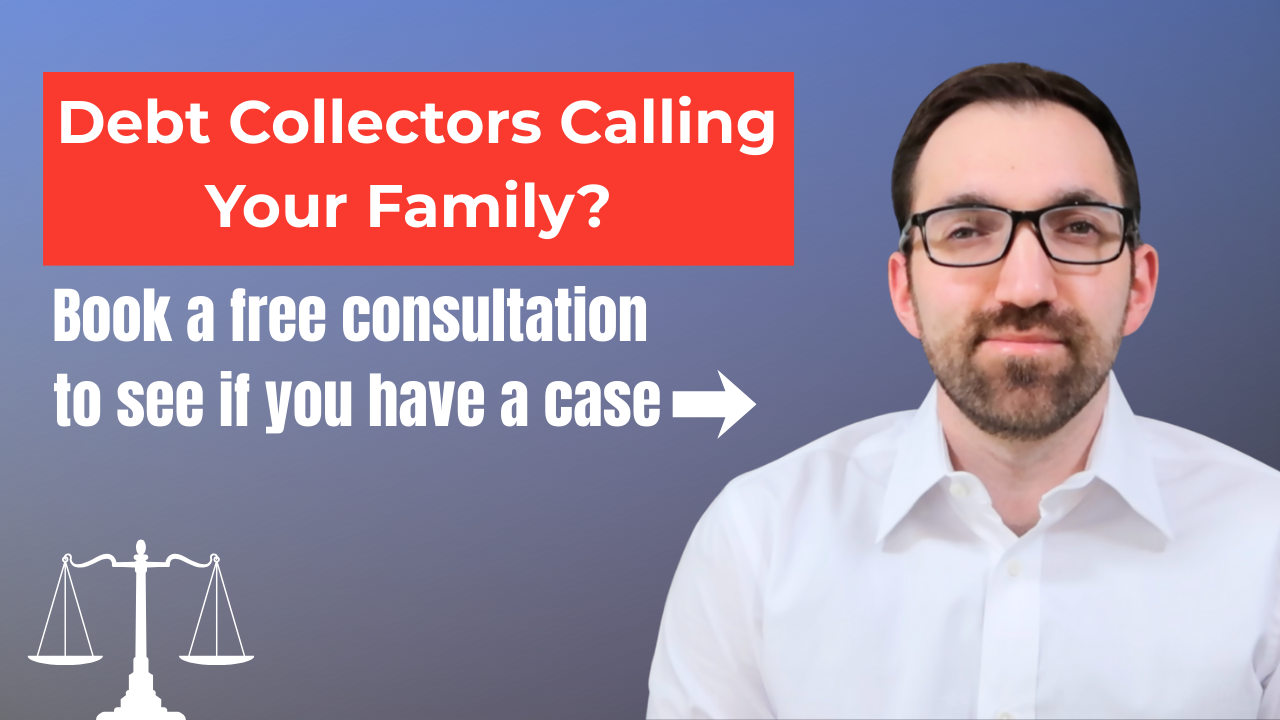How Do Debt Collectors Get Family Members Phone Numbers
It’s one thing when they call you. But now your family members. Where do debt collectors get off calling your parents, siblings, children, or grandparents. And how do they even know where to reach them.
In a world driven by data and technology, it has never been easier for collection agencies to track down people connected to you. In some limited circumstances, the law allows collectors to contact a relative simply to confirm your address or phone number. That risk comes with delinquent debt.
In many other situations, contacting family members is illegal. Not only do you have the right to make these calls stop, you may also be entitled to legal damages. This article explains how collectors find your family members’ numbers and, more importantly, when these communications cross the line under federal law.
How do Debt Collectors get Family Members Phone Numbers
A better question is how they don’t get them. This is exactly what collection agencies are built to do. Their entire business model revolves around locating people who are hard to reach and contacting them about overdue accounts for banks, lenders, and other creditors.
Collectors use a mix of advanced tools and basic detective work. Sometimes they run your information through paid search services that piece together your contact history. Other times they just scroll through your social media and see who shows up in your life. Either approach can reveal the people you are connected to in the real world.
Skip tracing is a paid lookup service that pulls your information from large data sources like past addresses, old phone numbers, public records, and previous applications you’ve filled out. Think of it as a high powered search engine that collectors pay for because it gives fast and detailed results.
When a collector runs skip tracing on you, the system doesn’t stop at your own information. It automatically builds a web of people connected to you through old addresses, shared households, or linked phone numbers. That’s how a search meant to locate you ends up producing the phone numbers of parents, siblings, or any relative the database thinks might help find you.
When this doesn’t work or if collectors are trying to save money, they can also do a simple search of you on social media. As you likely already know, perusing through someone’s Instagram or FaceBook quickly shows who someone is closely connected to in the real-world. If a relative shares their number or leaves enough breadcrumbs, collectors can use that to reach out.
Collectors will use whatever tools they have to find you, even if that means calling your family first. Whether it comes from advanced software or a quick online search, any information that connects you to someone else can end up in a collector’s hands.
Why are Debt Collectors Calling my Family Members
When collectors cannot reach you, they move on to the next best option: your family. Under federal law, they are only allowed to contact a relative one time and only to confirm your current address or phone number.
In theory, this is the only reason why debt collectors contact your relatives. These calls usually happen when the collector’s file has outdated information. Returned mail, disconnected numbers, or months of no contact can trigger their system to check associated contacts.
The problem is the indirect pressure this creates. Nobody wants a collector calling their parents or siblings. Congress understood this when it passed the Fair Debt Collection Practices Act (FDCPA) and placed strict limits on what collectors can say during these calls. They cannot reveal you owe a debt. They cannot hint at money being owed. They cannot identify themselves as a debt collector unless the relative specifically asks who is calling
If they cross that line, you may have a legal claim. Red flags include a relative being told anything about a debt, a collector calling the same family member more than once, or a collector hinting that you might be in legal trouble. Any of these can violate federal law and may entitle you to damages.
How to Stop Debt Collectors from Calling Family Members
Collectors are only allowed to contact your family members if they don’t know your location information. If you send them a letter with your contact information and demand that all future communications be made with you, then the debt collectors no longer have a permissible purpose to contact your family.
Send that letter via certified mail and save a copy of the letter and the certified mail receipt for your records. If the collector continues to contact your family after receiving this letter, this is likely a violation of the FDCPA and you may have a legal claim against them.
You should also document every call that happens after the letter is delivered. Take screenshots of missed or incoming calls. Save voicemails. Keep copies of any call recordings your family receives. Clear documentation strengthens your case if you decide to pursue an FDCPA claim against the collector.
Talk to an FDCPA Attorney
A successful FDCPA case can award up to one thousand dollars in statutory damages, along with compensation for any real harm the collector caused, including stress, anxiety, or embarrassment. The law also requires the collector to pay your attorney’s fees if you win. That structure exists so consumers can enforce their rights without worrying about legal costs.
If collectors are repeatedly contacting your family about a debt you owe, you may have a valid claim. Reach out for a free consultation and case review. We’ll walk you through your options, explain whether legal action makes sense, and help you decide the best way to handle an aggressive collector.



